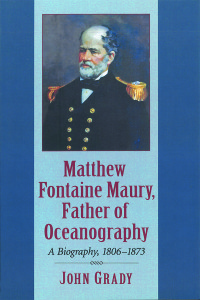Lecture Date: February 11, 2016

Matthew Fontaine Maury was a key, if controversial, figure in American naval history. Born on what is now the Wilderness Battlefield, he considered himself a Virginian although his family had moved to Tennessee when he was a child. His family’s roots were wide and deep in Fredericksburg and Spotsylvania County. Maury championed many political causes throughout his career, ranging from righting the ills of a clique-ridden Navy establishment to forcefully advocating for Southern rights before and during the American Civil War. However, it is his work charting sea lanes for which he is remembered as the “Father of Oceanography” and made his international scientific reputation. He bested Great Britain’s admiralty in securing the fastest, safest routes to India and Australia and helped connect the Americas and Europe with the first transatlantic telegraph cable.
During the Civil War, Maury served in the Confederate Navy as the Chief of Sea Coast, River, and Defenses. While he ran afoul of Confederate President Jefferson Davis and Secretary of the Confederate Navy Stephen Mallory on more than one occasion, Maury proved himself a competent international diplomat, skilled buyer of commerce raiders, and invaluable inventor. He perfected the “electric torpedo,” similar to a modern contact mine, during the war and thus wreaked havoc on Union ships.
When the war ended, Maury led the Confederate immigration to Mexico. As Maximilian’s regime was collapsing without French support, he returned to Great Britain and tried selling his expertise in modern naval warfare to support his family in exile. It was a constant struggle. Maury finally returned from London to Virginia in 1868 and played a key role in trying to rebuild the war-devastated state. To the end of his life, Maury labored to establish a national weather service to do for farmers and merchants what he had done for shippers and mariners. It was his last unfinished crusade.
Speaker: John Grady

John Grady, a managing editor of Navy Times for more than eight years and retired communications director of the Association of the United States Army after 17 years, is the author of a biography of Matthew Fontaine Maury, a leading figure in the United States and Confederate navies and one of the 19th century’s most prominent scientists. It is entitled “Matthew Fontaine Maury: Father of Oceanography.” He also has contributed to the New York Times “Disunion” series, Civil War Monitor, and is a blogger for the Navy’s Sesquicentennial of the Civil War site. He continues writing on national security and defense. He covered the Army deployed in the Balkans during the 1990s and early 2000s and its changes in training and deployment patterns for Afghanistan and Iraq. His later work has appeared on USNI.org, BreakingDefense, Government Executive, govexec.com, and nextgov.com, among others.